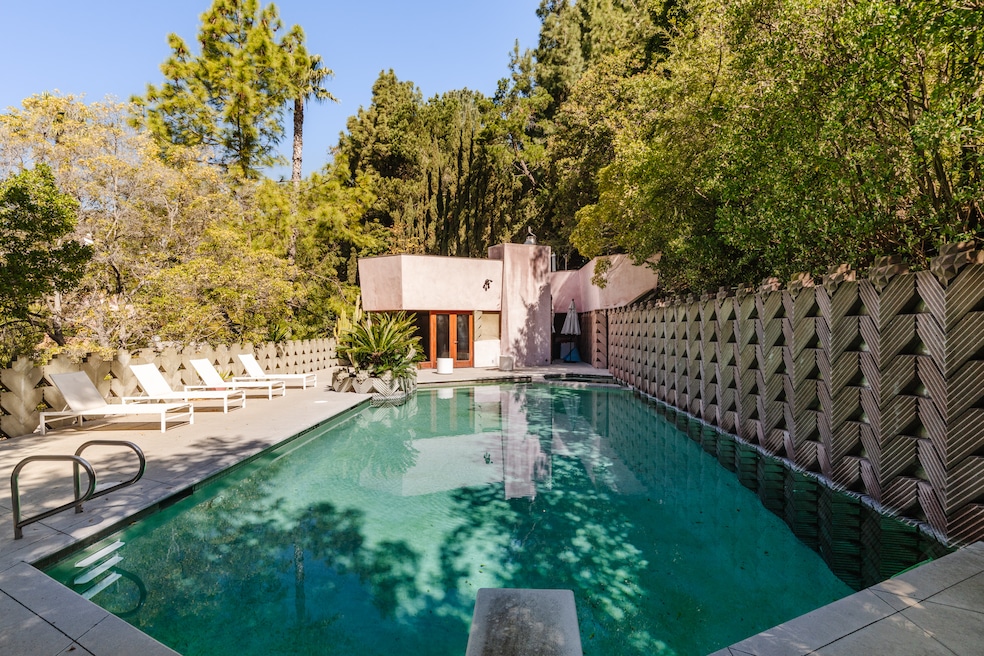Celebrity houses are a dime a dozen in Los Angeles. It’s equally common to find architecturally significant homes designed by some of the world’s foremost creators, or properties featured in various types of media.
What is rare, though, is a celebrity-owned, architectural property that holds significance in Hollywood. And that’s exactly what real estate agent Marc Silver is trying to sell now.
“I’ve been very fortunate to sell a lot of historic homes, a lot of architectural homes and a lot of celebrity-owned homes. This is probably the first time in my career that I’ve had something that ticks all of those boxes,” he told Homes.com in an interview.
That “something” is filmmaker David Lynch’s Hollywood Hills compound partly designed by Frank Lloyd Wright’s son and grandson. The property consists of five contiguous parcels. All told, there are 11,000 square feet of living space, 10 bedrooms and 11 bathrooms.

The compound hit the market Thursday with a $15 million price tag, according to a listing on Homes.com. The sale comes after Lynch died in January at 78.
“The family is selling the property, and they are hopeful that someone will appreciate what David built, and it will continue in its current form,” according to Silver, an agent with The Agency.
A compound built around a Lloyd Wright piece
At the heart of the property is the “Beverly Johnson House,” a pink, midcentury modern residence built by Lloyd Wright in 1963. Lynch bought the home in 1987, kicking off what was a years-long project that resulted in the larger compound.
In 1989, Lynch purchased the home next door. That residence housed Lynch’s production company and offices. Four years later, in 1991, he hired Eric Wright, Lloyd Wright’s son, to add a pool and pool house to the Beverly Johnson property.

Then, in 1995, Lynch added what Silver described as “the most recognizable” part of the property: another neighboring residence that became the backdrop for his movie “Lost Highway.” The home includes Lynch’s screening and editing rooms.
“A Lloyd Wright with an Eric Lloyd Wright guest house would be newsworthy in itself,” Silver said of the property’s history. “But as just part of the larger package or the larger compound, it’s pretty incredible. And then of course, the Hollywood provenance of it all.”
“I can’t think of another property in Los Angeles that has the architectural significance, the historical significance, as well as the cultural, Hollywood impact that this property has,” he added.
Finding the next creative to manage a historic property
As much as the home offers, though, it can take work to manage large homes — especially historic, Wright-designed homes.
Take The Ennis House, another father-son Wright project, for example. It was built in 1940, and by 2005, it ranked among America's most endangered historic places due to deferred maintenance, the conservancy said. The home required a complete restoration. Another of Lloyd Wright's projects, The Derby House, recently hit the market, missing walls and all.
Silver said he's confident the next owner of Lynch's compound will be able to maintain the property, though.
“I sell dreams and lifestyles,” he said. “If you have a property like this, you find a way to do it. You’re not out mowing yards or anything like that.”

And as for who that next owner might be, Silver said he sees a few possible outcomes for the historic property. For one, it could go to a foundation looking to create a space for young artists. It could also become a museum to remember Lynch's legacy. In the case that it serves as a primary residence again, though, Silver thinks it's a fit for a creative.
“It’s a private sanctuary, but in the heart of Hollywood," he said, "so someone who is creative, perhaps a writer, director or even a musician. Someone who wanted to have it as a place where they could record music.”
